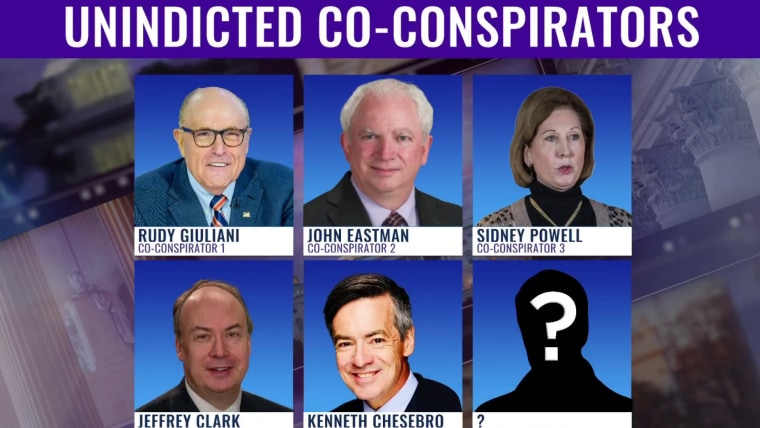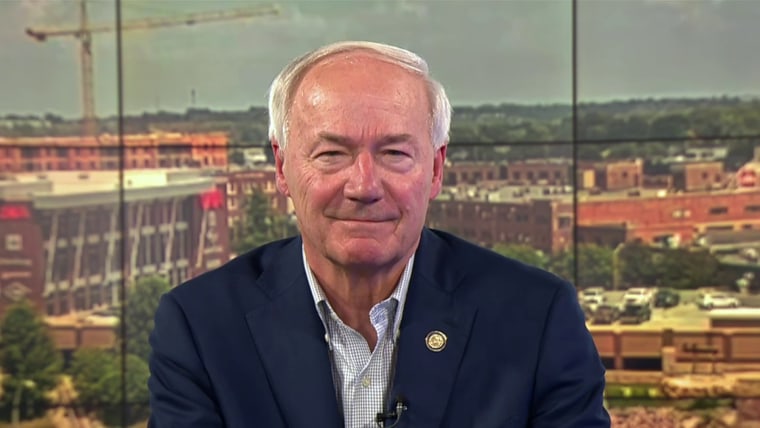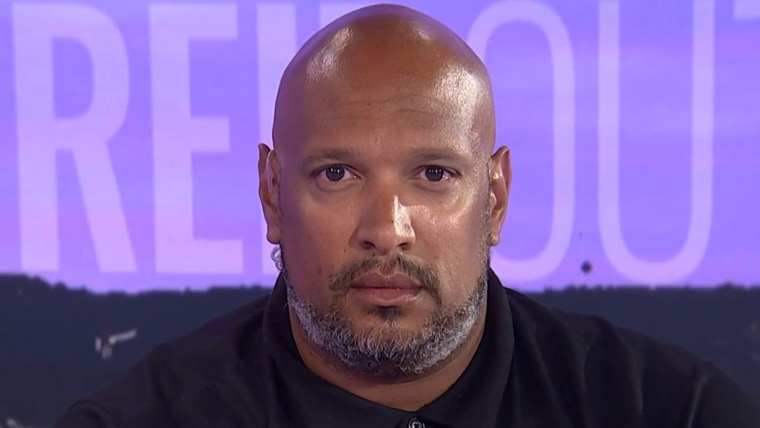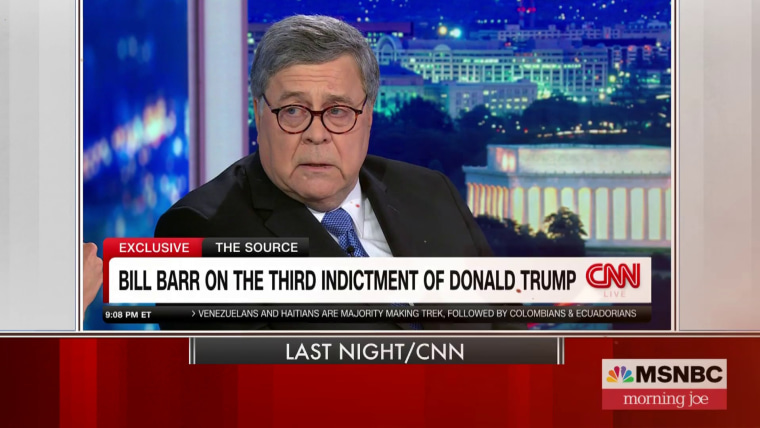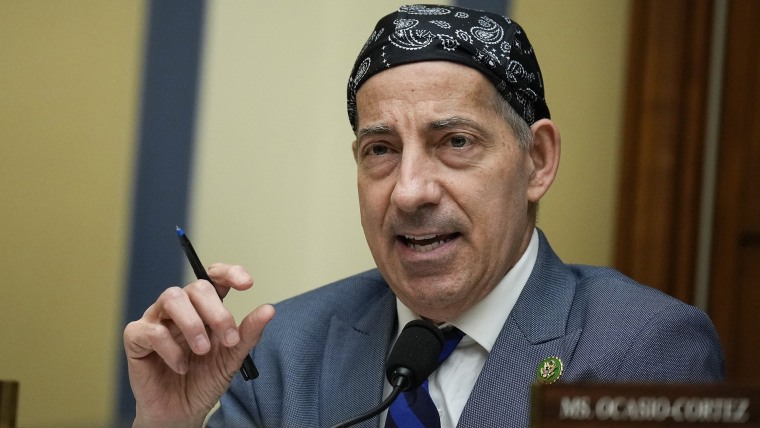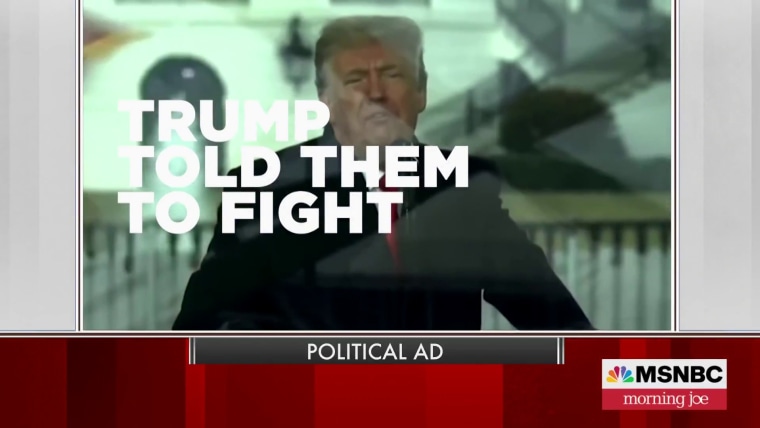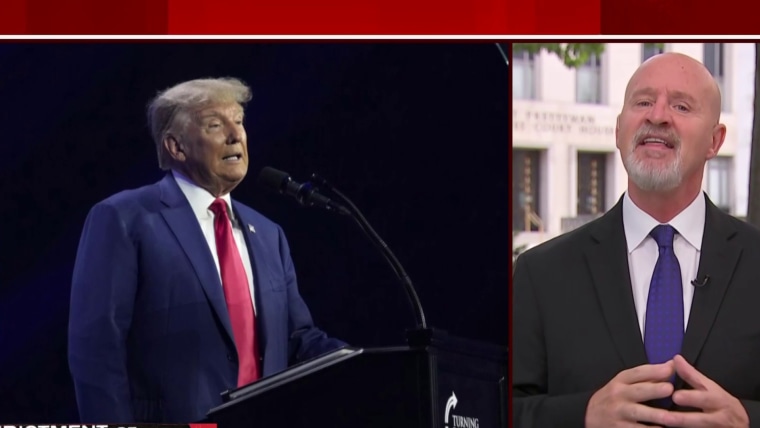10m ago / 8:26 PM UTC
Trump pleads not guilty (no surprise there)
Trump, standing and facing the judge, pleads “not guilty” to all charges.
18m ago / 8:19 PM UTC
The judge has arrived, 15 minutes past the scheduled start time
The magistrate judge, Moxila Upadhyaya, really knows how to build anticipation. She arrived to the courtroom 15 minutes past the scheduled hearing time of 4 p.m. ET.
“Good afternoon, Mr. Trump,” she said after lawyers on both sides introduced themselves, according to NBC News.
21m ago / 8:15 PM UTC
Trump shouldn’t hold his breath for a venue change
Trump and one of his lawyers have said they want to move his latest charges out of Washington. Sen. Lindsey Graham, R-S.C., chimed in to complain that a conviction in the nation’s capital would be “not legitimate.”
But if they don’t know this already, they’ll be disappointed to see that, as I explain here, Jan. 6 defendants have roundly lost attempts to escape prosecution in Washington. Among other things, one such ruling noted that Washington courts have “already rejected the argument that D.C. residents are incapable of fairness in highly politically-charged criminal prosecutions.”
Though Trump’s trial would be more “politically-charged” than most, that won’t be reason enough to move his case.
27m ago / 8:10 PM UTC
What reporters are seeing inside the courtroom
As of 4:01 p.m. ET, Judge Upadhyaya had not yet arrived in the courtroom.
Meanwhile, according to NBC News, the prosecutors and the defense are sitting across the room facing each other (if Smith wants to stare down Trump as he did during the last arraignment, this seating configuration should make it easy for him).
40m ago / 7:56 PM UTC
It’s happening: Trump and Smith arrive to the courtroom
Trump entered the courtroom at 3:51 p.m. ET, according to NBC News, a few minutes after Smith, who is sitting behind his prosecutors.
Also present, in the court’s overflow room, are three officers who responded to the attack on the Capitol on Jan. 6: Capitol Police Officer Harry Dunn, Metropolitan Police Officer Daniel Hodges and former Capitol Police Sgt. Aquilino Gonell. Last week, Dunn spoke to The ReidOut Blog’s Ja’han Jones about what a Trump indictment signifies to him.
44m ago / 7:53 PM UTC
3 things I’ll be looking for during this arraignment
There may be standard conditions of release that are read to the former president with respect to who he can contact, and locations he can go to and not go to. And there are standard rules in D.C. with respect to things that you could say that could prejudice a potential juror. So I’ll be listening for whether the magistrate does that.
The other thing that could happen that is standard practice in the D.C. U.S. attorney’s office, in other words in that courthouse, for the government to turn over discovery, at the time of arraignment, so I wouldn’t be surprised to hear something from the government about the status of discovery. We did hear something like that in the classified documents case.
And then finally we should be listening to whether the magistrate advises the parties as to the date on which the assigned judge in the case, Judge Tanya Chutkan, wants the parties to appear in front of her. And I wouldn’t be surprised if that was a relatively short date, but that’s a way for the court, the actual assigned judge, to notify people when she wants to see them.
52m ago / 7:44 PM UTC
No, Jack Smith doesn’t have to prove Trump’s state of mind
Even before this week’s indictment, many were wondering how Jack Smith and his team could prove that Trump knew he’d lost the 2020 election.
As soon as the indictment was unsealed, Trump lawyer John Lauro told Fox News, “I would like them to try to prove beyond a reasonable doubt that Donald Trump believed that these allegations were false.”
In fact, as Reason’s Orin Kerr and others have pointed out, there’s already evidence in the public record of Trump acknowledging he lost, and Smith may have more evidence that’s not in the indictment.
But regardless, Smith doesn’t need to prove what Trump knew, as legal experts Norm Eisen, Joshua Kolb and Fred Wertheimer explained for MSNBC Daily yesterday:
Smith also avoids the most complicated aspects of having to prove Trump’s state of mind. The indictment alleges, and provides voluminous evidence suggesting, that Trump knew he lost the election. However, none of the statutes charged require a jury to determine this specifically.
Instead, the requisite proof of criminal intent can be established simply by proving some, or all, of the following charges: Trump deceitfully attempted to get states to overturn the election results, the electoral certificates Trump utilized in his scheme were false, Trump attempted to leverage the Justice Department to use deceit to replace legitimate votes with Trump votes, Pence did not have the authority to override the electoral votes or pause the count of electors on Jan. 6, Trump exploited the violence and chaos at the Capitol on that day toward these ends, or that Trump intended to prevent the electoral votes of the American people from being counted correctly.
Read more from the authors below:
57m ago / 7:39 PM UTC
What we know about today’s judge
The judge presiding over today’s arraignment is not the same one who has been assigned to oversee the case.
Moxila Upadhyaya is the federal magistrate judge who will handle today’s proceedings before handing off to U.S. District Judge Tanya Chutkan, the federal trial judge assigned to the case.
So what do we know about Chutkan, a Barack Obama appointee? As Jordan Rubin wrote for Deadline: Legal Blog earlier this week:
For one thing, she has experience with Jan. 6 cases.
NBC News’ Ryan Reilly recalled that Chutkan has sentenced defendants in these cases to longer terms than even the government had requested. (Conversely, recall that federal prosecutors are appealing sentences handed down by another federal judge in Washington, Amit Mehta, for being too low in the government’s view.)
Read more below:
1h ago / 7:31 PM UTC
Don’t expect this indictment to seal Trump’s political fate
Three indictments, two impeachments and infinite scandals later, could Trump’s political demise be unfolding before our eyes? Don’t count on it.
While Trump’s upcoming trials could lead to convictions and ultimately prove detrimental to his 2024 presidential run, it would be a mistake to assume his legal challenges will end his political career.
Keep in mind: Trump has emerged defiant from seemingly unrecoverable controversies, from the infamous “Access Hollywood” tape to a jury finding him liable for sexual assault.
As MSNBC Daily’s Zeeshan Aleem wrote in June following Trump’s second indictment:
Trump has yet to do anything since his rise to power to lose the support of his core base; his political identity involves openly arguing that political and legal rules should be broken in order to make America great again. … Banking on convictions to eliminate the threat posed by Trump is shortsighted. There are virtually no convictions that can bar Trump from winning office or acting as president, and he has a variety of tools available to either avoid being sentenced before taking office or pardoning himself upon taking office. A Trump victory remains plausible, and attention and energy should remain laser focused on mobilizing and making the electoral case against an authoritarian threat. Nobody is coming to save us — only we can protect ourselves.
Read more from Zeeshan’s post below:
1h ago / 7:27 PM UTC
First sketch from inside the courthouse
Here’s what was happening inside Prettyman federal courthouse earlier this afternoon ahead of Trump’s arrival:
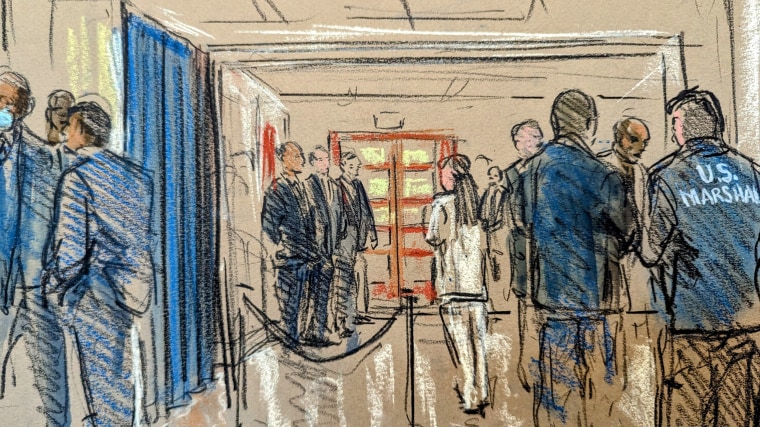



1h ago / 7:15 PM UTC
5 key details you might have missed in the indictment
I spent an inordinate amount of time on Tuesday hitting refresh on the federal court system’s electronic dockets in anticipation of Trump’s newest indictment.
But for those of you who are normal consumers of news and analysis, and lacked the time or energy to scrutinize those 45 pages, never fear. I’ve picked out the five most interesting or head-scratching things about the indictment.
For one, we don’t know, but it sure seems like Mark Meadows may have provided information that incriminates Trump — and himself.
Read more below:
1h ago / 7:08 PM UTC
Jan. 6 officers try to attend Trump’s arraignment
When Trump is arraigned in federal court this afternoon, the audience may include law enforcement officers who were present at the Capitol on Jan. 6.
“A few of the officers who responded to the insurrection at the Capitol on Jan. 6, 2021, hope to attend the first hearing in special counsel Jack Smith’s indictment against Trump,” NBC News reported. “It’s not clear whether they’ll be able to get inside due to significant public interest and limited space, but there are some overflow seats outside of the main courtroom.”
Among those hoping to attend is Capitol Police Officer Harry Dunn, who has been honored for defending Congress that fateful day. He recently told The ReidOut Blog’s Ja’han Jones what a Trump indictment means to him:
Indictments are only a part of the way to justice. Real justice is what? A guilty verdict. With an indictment — just say the trial doesn’t happen ’til after the election, and say Trump wins. You know that s— goes away if he wins, right? So if that happens, is that justice? ‘We got the indictment! We got justice!’ No, we didn’t. So it’s a mile marker on the way to justice — it’s what should happen when somebody breaks the law. You get investigated, you get indicted, you get convicted, you get sentenced. That’s f—ing justice.
2h ago / 6:41 PM UTC
Will Jack Smith stare down Trump again?
During Trump’s last arraignment in June, in Smith’s classified documents case, the special counsel reportedly didn’t take his eyes off the former president throughout the proceeding. It remains to be seen whether Smith will take the same approach this time around — or if he will even be present in the courtroom today.
Smith has become something of a household name at this point, but here’s a refresher on his background and how he became a key figure in some of Trump’s historic legal battles.
Attorney General Merrick Garland appointed him as special counsel in November 2022 to lead two separate investigations: one into Trump’s retention of classified documents, and the other into 2020 election interference and Jan. 6, 2021.
Smith, 54, has an impressive resume, with experience ranging from the New York County District Attorney’s Office to The Hague, where he investigated war crimes at the International Criminal Court. Yet his greatest strength in this case may be his relative anonymity and apolitical reputation, which serves as an important defense against Trump’s tactic of name-calling and polarization.
As Charlie Dent wrote for MSNBC Daily in June:
Pre-Trump, the idea that a former president of the United States would viciously and publicly insult and undermine the prosecutors investigating him would have been absurd. But this is not a politician — or political movement — that respects the criminal justice system. Indeed, it’s already clear that, whatever the merits of the cases investigated by Manhattan District Attorney Alvin Bragg and Fulton County District Attorney Fani Willis, Trump and his allies have found plenty of angles of attack.
For one thing, both of those prosecutors are elected Democrats, enabling Trump to hammer them as politically motivated hacks. As an unelected career prosecutor, Smith is not currently aligned with a political party. Trump can complain about witch hunts all he wants, but political bias is far harder to argue with Smith — at least with a straight face. And it should be harder for both Democrats and Republicans to use politics to undermine his conclusions.
2h ago / 6:09 PM UTC
Who testified before the grand jury in this case?
No indictment happens without a grand jury. Before deciding whether criminal charges should be brought, a grand jury hears the evidence, so let’s take a look at whose testimony may have helped lead to Trump’s latest indictment.
In April, former Vice President Mike Pence testified after receiving a subpoena. The testimony came after legal fights from both Pence, who declared the summons “unconstitutional,” and Trump, who was resistant to having his former VP (and current 2024 competitor) speak under oath.
Other Trump allies who reportedly testified include former White House senior adviser Stephen Miller, former House Speaker Newt Gingrich and Trump’s 2020 deputy director of Election Day operations, Gary Michael Brown. Former White House chief of staff Mark Meadows is thought to have testified in both of special counsel Jack Smith’s probes, reportedly leading some members of Team Trump to start using a rat emoji to refer to him.
In June, several Secret Service agents who may have been eyewitnesses to Trump’s Jan. 6 behavior testified, as did Nevada GOP Chair Michael McDonald and the state party’s vice chair, Jim DeGraffenreid — two of the “fake electors” in Trump’s attempt to overturn the election.
Ultimately, it seems that people in Trump’s orbit may hold the key to this case.
3h ago / 6:01 PM UTC
It’s time to drag the federal judiciary into the present day
Cameras in federal courtrooms? It can happen, and I believe it has to happen.
We have to drag the federal judiciary into the present day, even if they’re figuratively kicking and screaming. It’s a little bit absurd that courtrooms and criminal trials are public proceedings, and yet the limitation (with respect to the public observing those proceedings) is the size of the courtroom? That doesn’t make any sense.
I have heard that they will be broadcasting or livestreaming the proceedings to other courtrooms, what we call overflow courtrooms, so maybe 100 or 150 people who will be directly impacted by how this trial ends up can observe the proceedings. That makes no sense.
Ultimately, it will be up to Supreme Court Chief Justice John Roberts to decide whether this is the moment in time when the rules should make sense and they should militate in favor of transparency when it comes to watching what the leader of our nation did to our nation. I sure hope Roberts orders that these proceedings be televised.
I think cameras in the courtroom are a must because if we don’t have them, what are we going to get? A one-sided account coming from Trump’s lawyers. You’re not going to get anything from Jack Smith and his federal prosecutors, and frankly, that will not be a fair fight in the court of public opinion. And let’s be real, this case in part will be fought and won or lost, at least in the minds of voters, in the court of public opinion.
From Glenn Kirschner’s appearance on “Morning Joe” earlier today. It has been edited slightly for length and clarity.
3h ago / 5:29 PM UTC
3h ago / 5:28 PM UTC
Trump posts to Truth Social : ‘I am being arrested for you’
Trump seems to be having a normal morning (as far as Trump mornings go), firing off several all-caps posts on his Truth Social site.
“I need one more indictment to ensure my election!” he wrote a couple of hours ago, adding in a later post: “I am now going to Washington, D.C., to be arrested for having challenged a corrupt, rigged & stolen election. It is a great honor, because I am being arrested for you.”
Trump has maintained a hefty lead over Florida Gov. Ron DeSantis and the rest of the GOP presidential contenders, despite (or perhaps, with the help of) his three indictments. And while he saw a major boost in donations in the wake of his first indictment (the hush money case in New York), he’s seen diminishing returns on the subsequent indictments.
3h ago / 5:13 PM UTC
This case doesn’t turn on any one witness
The words, sentences and paragraphs in this indictment are significant and they make for a compelling case.
I also don’t think this case turns on any one witness. As alleged in the indictment, there’s a whole bunch of people who had candid conversations with Trump, told him he lost, and told him that he had no basis in law or fact to submit slates of fake electors to try and steal the election.
But good prosecutors don’t talk about slam dunks and guarantee wins. Juries can do anything. When you walk into court as a prosecutor, you walk in with two things: a strong case and a dose of humility.
This is from Chuck Rosenberg’s appearance on “Andrea Mitchell Reports” moments ago. It has been slightly edited for length and clarity.
4h ago / 4:41 PM UTC
As a lawyer, here’s what stood out to me in the indictment
Trump’s 2020 election indictment is 45 pages of vivid allegations that read like a compelling novel. But the shocking descriptions within it appear to be not fiction but reality, and the events are now a dark stain on American history.
This document begins with Smith setting the stage with a brief description of where the alleged crimes took place as well as the main players. But after that quick scene setter, Smith opens the floodgates.
Read the notes I jotted down as I read the indictment in my annotated version below:
4h ago / 4:16 PM UTC
Trump is far from the only person charged in Jan. 6
Trump is hardly the first person to face arrest in connection with Jan. 6, 2021.
In fact, more than 1,000 people have been arrested, according to the Justice Department. Of those, nearly 600 have pleaded guilty and about 335 have received time behind bars.
The sentences have ranged in length. Stewart Rhodes, the founder of the far-right Oath Keepers militia group, was sentenced to 18 years, the longest term so far. As of May, the median sentence was 60 days, according to Time magazine.
Multiple Jan. 6 suspects are still wanted by the FBI. One even left the U.S. and was granted asylum by Belarus.
So the next time Trump claims he’s being unfairly prosecuted, just remember: As far as Jan. 6 goes, his case is joining more than 1,000 others.
4h ago / 4:14 PM UTC
The scene outside Prettyman federal courthouse
Trump will be arraigned at E. Barrett Prettyman federal courthouse in Washington, which is less than half a mile from the U.S. Capitol. Security measures have been bolstered in recent days around the courthouse, including barriers and increased police presence.
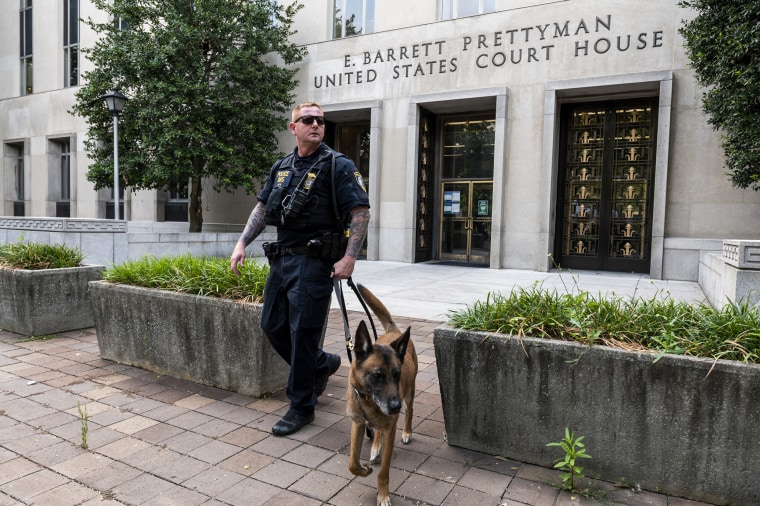



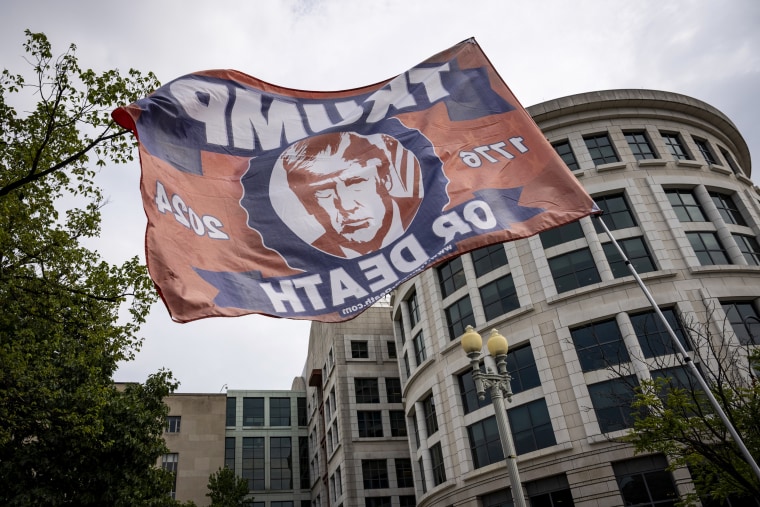



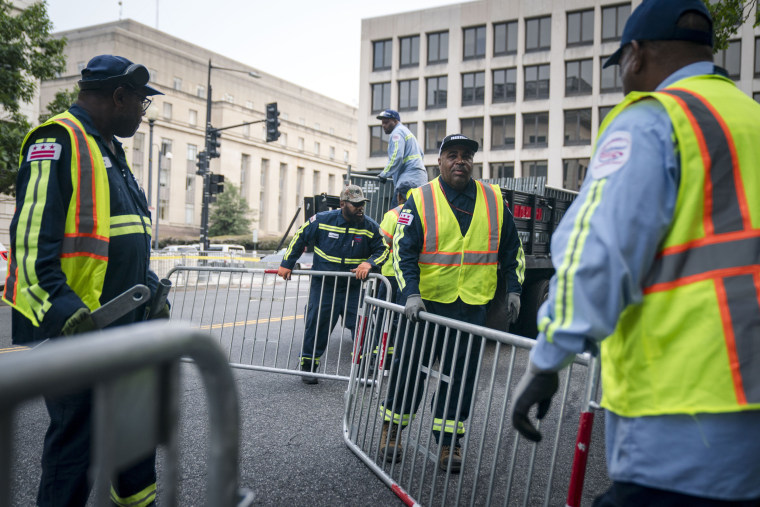



4h ago / 4:11 PM UTC
What to expect today
Trump is scheduled to be arraigned at 4 p.m. ET at the Prettyman federal courthouse in Washington, less than half a mile from the U.S. Capitol.
He will be arrested and taken into custody, where he be fingerprinted. Like his last two arraignments (one for the classified documents case in Florida and the other for the hush money case in New York), he will not have a mug shot taken. He is expected to enter a plea during the proceeding.
It’s unclear if he will address the press before or after the arraignment. There are just 11 seats reserved for the media in the courtroom, according to NBC News, and no cameras are allowed in the courtroom (like any other federal courtroom).
This post was originally published on this site be sure to check out more of their content.




